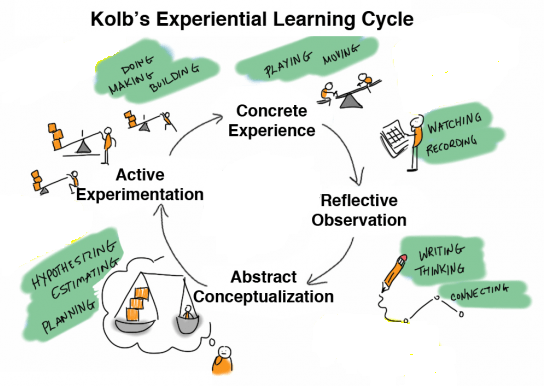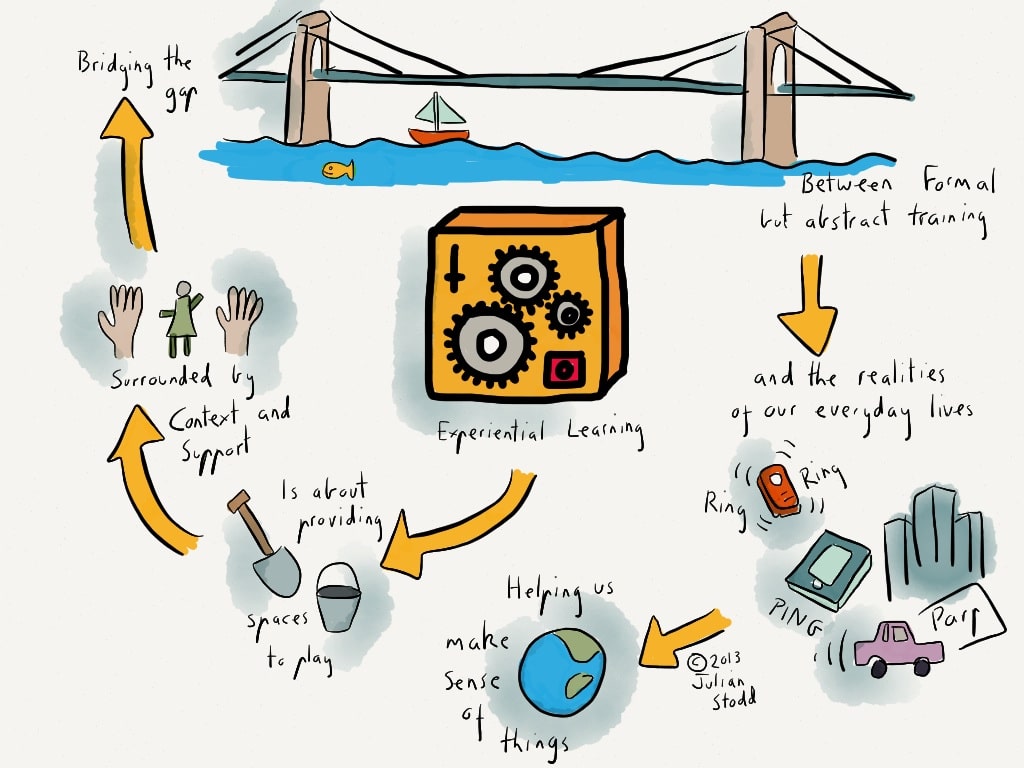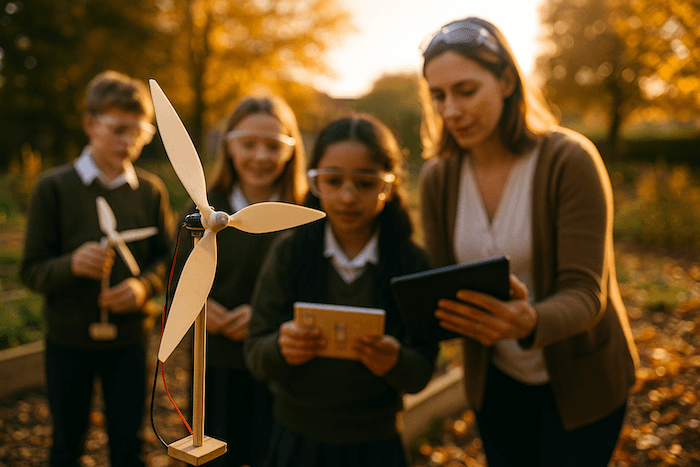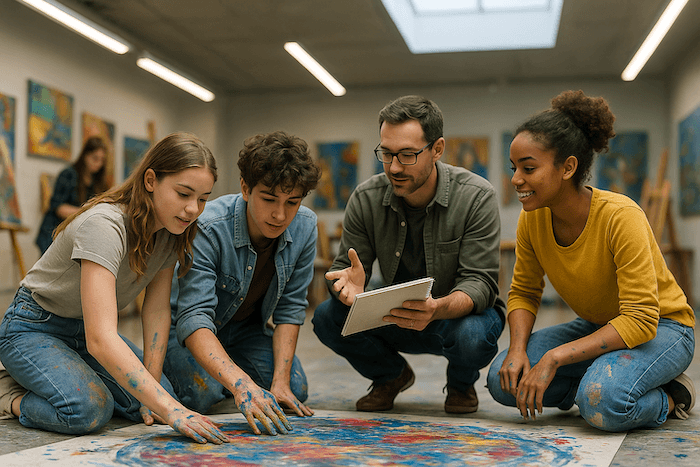Experiential Learning
Explore experiential learning: its definition, Kolb's model, classroom implementation, key stages, and the roles of instructors and students in the process.


Explore experiential learning: its definition, Kolb's model, classroom implementation, key stages, and the roles of instructors and students in the process.
Experiential learning is an educational approach built around active involvement, reflection, and personal meaning-making. Rather than positioning students as passive recipients of information, it invites them to engage directly with the world—solving problems, working collaboratively, and drawing conclusions from their own experiences.
This learner-centered model places doing and reflecting at the core of the learning process. Whether it’s through building a prototype, participating in a role-play, or contributing to a community project, the emphasis is on exploration with purpose. Learners immerse themselves in an activity, encounter real challenges, and then pause to consider what the experience revealed—about the content, the context, and themselves.
Unlike more traditional methods that often prioritise explanation before action, experiential learning begins with a lived moment and works outward. It allows learners to connect abstract concepts with tangible encounters, bridging theory and practice in a way that feels relevant and immediate.
It’s also remarkably versatile. A science lesson might involve designing a water filtration system. A history unit might ask students to simulate a town hall debate. Even a simple outdoor maths task can become an experiential moment when learners estimate distances and then test them physically. These aren’t just activities—they’re opportunities to think critically, collaborate meaningfully, and see learning in motion.
As Benjamin Franklin once put it, “Tell me and I forget, teach me and I may remember, involve me and I learn.” Experiential learning honours that principle. It’s not a supplement to learning; it’s a powerful route into deeper understanding—where participation leads to ownership, and reflection turns experience into insight.
In 1974, David Kolb created his Experiential Learning Cycle. Kolb's four-stage Experiential Learning Theory model perceives education as an integrated process. All of these four stages are mutually supportive as David Kolb's Philosophy Of Education demonstrates that effective learning is cyclic involving experience, reflection, critical thinking process and action.
According to David Kolb's Experiential Learning Theory learning is a process in which knowledge is developed through the modification of experience. Kolb's Experiential Learning Model has four stages:
Concrete Experience (CE): To feel
Reflective Observation (RO): To watch
Abstract Conceptualization (AC): To think
Active Experimentation (AE): To do
The above four steps or stages, of learning frequently move in the form of a cycle that starts with a learner having a concrete experience and finishes with their active experimentation on learning.

Experiential learning doesn't rely on the idea that each student has a fixed learning style -visual, auditory, kinaesthetic, or otherwise. In fact, the research now tells us that the popular learning styles theory is, at best, a simplification. People don’t learn better because content matches a preferred style; they learn better when they engage with ideas in varied and meaningful ways.
In the classroom, this means offering a rich blend of experiences—ones that allow students to interact, reflect, experiment, and revisit ideas from different angles. A hands-on science activity, a class debate, a role-play in history, or even a well-framed discussion around a controversial text—these all create space for learners to explore and build understanding through the experience, not just after it.
While lectures and instruction still have their place, they become more impactful when they’re part of a wider cycle—what David Kolb called the learning cycle: concrete experience, reflective observation, abstract conceptualisation, and active experimentation. In this view, a teacher’s explanation might be the start of an abstract idea, but it becomes meaningful when students use it, test it, or model it for themselves.
John Dewey also argued that the classroom shouldn’t be a sealed-off space but a miniature version of real life. So when learners collaborate on a group project, reflect on a field visit, or even build a model to represent their thinking—they’re not just completing tasks. They’re participating in learning that feels purposeful and connected to the wider world.
Whether it’s a student coding a simple game, building a structure to explore forces, or journaling about a personal experience, what matters most is how the experience is structured—how it invites thinking, and how it supports students in drawing meaning from what they’ve done.
In short, experiential learning in the classroom isn’t about catering to preferences. It’s about creating opportunities for deep, active engagement - where students learn not just by receiving knowledge, but by grappling with it, applying it, and shaping it into something of their own.
Unlike the outdated notion of fixed learning styles, experiential learning offers a flexible and reflective structure that supports meaningful engagement. Rather than tailoring content to a supposed preference, this approach focuses on how students actively interact with ideas—through doing, sharing, analysing, and applying. Each phase invites deeper involvement with the content, their peers, and their own thought processes.
Below are the key stages of experiential learning, adapted from David Kolb’s model, and shaped for classroom use:
This is where learning begins—with direct, hands-on involvement. Learners take part in a meaningful task or challenge, often with minimal teacher direction. Activities might include building a prototype, delivering a presentation, role-playing a character, solving a real-world problem, or engaging with a game-based scenario.
The emphasis here isn’t just on the task itself, but on the experience of participation. It’s about giving students something concrete to wrestle with, observe, and reflect on later. This stage sets the foundation for insight—not by frontloading explanation, but by immersing learners in a challenge worth thinking about.
After the experience, learners are invited to reflect and share. In small groups or as a whole class, they talk through what they noticed, what stood out, and how they felt during the activity. This reflection isn’t limited to outcomes—it includes observations, reactions, and even moments of uncertainty.
By speaking and listening, students begin to make sense of their experience, connecting it with previous learning and surfacing different perspectives. This stage values the emotional and social dimensions of learning, encouraging learners to slow down and notice what actually happened.
Learners will communicate, evaluate and reflect upon their learning experience. Explaining and evaluating their concrete learning experience enable learners to connect their learning to future academic experiences.
Learners will talk about the process of their learning experience, and how issues, problems and themes arose as an outcome of the learning process. Learners will share how particular issues or problems were dealt with and how to identify recurring topics.Next comes a deeper layer of thinking. Learners are encouraged to look for patterns, themes, and problems that emerged. What skills were used? What challenges came up? How did decisions affect the outcome? Here, they begin to connect their lived experience to broader academic ideas.
This phase often involves critical questioning, drawing comparisons, and surfacing key insights. It's also a moment where learners evaluate the learning process itself—thinking about how they approached the task, what strategies they used, and how they might approach it differently next time.
At this point, learners step back even further to ask: What does this tell us? What broader ideas or principles can we draw from this? This stage moves beyond the immediate experience to find transferable insights.
They might recognise a pattern of teamwork that helped their group succeed, a strategy for managing frustration during problem-solving, or a recurring theme that connects this activity to something they’ve seen before in another subject. It’s about recognising significance beyond the task.
The final stage is about putting new understanding to use. Learners consider how what they’ve learned could apply to future situations—both in and beyond the classroom. They think about how their new skills, strategies, or ideas might help them in a different context or project.
This is also where ownership becomes key. The teacher’s role is to support learners in making the transfer from this experience to the next, while giving enough space for students to identify their own goals, questions, or next steps. Application cements learning—not as a memory, but as a usable tool.

In experiential learning, the teacher steps back from the traditional role of “knowledge provider” and instead becomes a facilitator of thinking and doing. This doesn’t mean doing less—it means doing something different: creating the conditions for learners to explore, reflect, and apply ideas meaningfully.
The process may require a shift in mindset, as well as some professional development to feel confident in designing and guiding experiential learning opportunities. When done well, it builds autonomy, curiosity, and deep engagement.
Here are 10 key ways educators support experiential learning:
This reframing helps create a classroom culture where students feel ownership of their learning—and where the teacher’s guidance is purposeful, responsive, and quietly powerful.

In experiential learning, students are not passive recipients of information—they are active participants in the learning journey. Their role is to engage directly with tasks, reflect meaningfully on their experiences, and take increasing responsibility for their progress.
While the teacher provides structure and guidance, students are encouraged to think independently, collaborate with peers, and respond creatively to challenges. It’s a shift from compliance to ownership.
Here are 8 key roles students take on during experiential learning:

Incorporating experiential learning in subjects that may not naturally lend themselves to this type of learning can be a creative and engaging process. Here are seven ideas across primary and secondary schools:
These methods can help students connect their learning to real-world contexts, enhancing their understanding and retention of the material. They also foster skills such as problem-solving, creativity, and collaboration, which are valuable in any subject area.

Here are five key studies on the efficacy of experiential learning and its implications for helping children. These studies collectively highlight the positive impact of experiential learning, including project-based and cooperative education approaches, on both teacher and student outcomes across various educational settings.
Experiential learning is an educational approach built around active involvement, reflection, and personal meaning-making. Rather than positioning students as passive recipients of information, it invites them to engage directly with the world—solving problems, working collaboratively, and drawing conclusions from their own experiences.
This learner-centered model places doing and reflecting at the core of the learning process. Whether it’s through building a prototype, participating in a role-play, or contributing to a community project, the emphasis is on exploration with purpose. Learners immerse themselves in an activity, encounter real challenges, and then pause to consider what the experience revealed—about the content, the context, and themselves.
Unlike more traditional methods that often prioritise explanation before action, experiential learning begins with a lived moment and works outward. It allows learners to connect abstract concepts with tangible encounters, bridging theory and practice in a way that feels relevant and immediate.
It’s also remarkably versatile. A science lesson might involve designing a water filtration system. A history unit might ask students to simulate a town hall debate. Even a simple outdoor maths task can become an experiential moment when learners estimate distances and then test them physically. These aren’t just activities—they’re opportunities to think critically, collaborate meaningfully, and see learning in motion.
As Benjamin Franklin once put it, “Tell me and I forget, teach me and I may remember, involve me and I learn.” Experiential learning honours that principle. It’s not a supplement to learning; it’s a powerful route into deeper understanding—where participation leads to ownership, and reflection turns experience into insight.
In 1974, David Kolb created his Experiential Learning Cycle. Kolb's four-stage Experiential Learning Theory model perceives education as an integrated process. All of these four stages are mutually supportive as David Kolb's Philosophy Of Education demonstrates that effective learning is cyclic involving experience, reflection, critical thinking process and action.
According to David Kolb's Experiential Learning Theory learning is a process in which knowledge is developed through the modification of experience. Kolb's Experiential Learning Model has four stages:
Concrete Experience (CE): To feel
Reflective Observation (RO): To watch
Abstract Conceptualization (AC): To think
Active Experimentation (AE): To do
The above four steps or stages, of learning frequently move in the form of a cycle that starts with a learner having a concrete experience and finishes with their active experimentation on learning.

Experiential learning doesn't rely on the idea that each student has a fixed learning style -visual, auditory, kinaesthetic, or otherwise. In fact, the research now tells us that the popular learning styles theory is, at best, a simplification. People don’t learn better because content matches a preferred style; they learn better when they engage with ideas in varied and meaningful ways.
In the classroom, this means offering a rich blend of experiences—ones that allow students to interact, reflect, experiment, and revisit ideas from different angles. A hands-on science activity, a class debate, a role-play in history, or even a well-framed discussion around a controversial text—these all create space for learners to explore and build understanding through the experience, not just after it.
While lectures and instruction still have their place, they become more impactful when they’re part of a wider cycle—what David Kolb called the learning cycle: concrete experience, reflective observation, abstract conceptualisation, and active experimentation. In this view, a teacher’s explanation might be the start of an abstract idea, but it becomes meaningful when students use it, test it, or model it for themselves.
John Dewey also argued that the classroom shouldn’t be a sealed-off space but a miniature version of real life. So when learners collaborate on a group project, reflect on a field visit, or even build a model to represent their thinking—they’re not just completing tasks. They’re participating in learning that feels purposeful and connected to the wider world.
Whether it’s a student coding a simple game, building a structure to explore forces, or journaling about a personal experience, what matters most is how the experience is structured—how it invites thinking, and how it supports students in drawing meaning from what they’ve done.
In short, experiential learning in the classroom isn’t about catering to preferences. It’s about creating opportunities for deep, active engagement - where students learn not just by receiving knowledge, but by grappling with it, applying it, and shaping it into something of their own.
Unlike the outdated notion of fixed learning styles, experiential learning offers a flexible and reflective structure that supports meaningful engagement. Rather than tailoring content to a supposed preference, this approach focuses on how students actively interact with ideas—through doing, sharing, analysing, and applying. Each phase invites deeper involvement with the content, their peers, and their own thought processes.
Below are the key stages of experiential learning, adapted from David Kolb’s model, and shaped for classroom use:
This is where learning begins—with direct, hands-on involvement. Learners take part in a meaningful task or challenge, often with minimal teacher direction. Activities might include building a prototype, delivering a presentation, role-playing a character, solving a real-world problem, or engaging with a game-based scenario.
The emphasis here isn’t just on the task itself, but on the experience of participation. It’s about giving students something concrete to wrestle with, observe, and reflect on later. This stage sets the foundation for insight—not by frontloading explanation, but by immersing learners in a challenge worth thinking about.
After the experience, learners are invited to reflect and share. In small groups or as a whole class, they talk through what they noticed, what stood out, and how they felt during the activity. This reflection isn’t limited to outcomes—it includes observations, reactions, and even moments of uncertainty.
By speaking and listening, students begin to make sense of their experience, connecting it with previous learning and surfacing different perspectives. This stage values the emotional and social dimensions of learning, encouraging learners to slow down and notice what actually happened.
Learners will communicate, evaluate and reflect upon their learning experience. Explaining and evaluating their concrete learning experience enable learners to connect their learning to future academic experiences.
Learners will talk about the process of their learning experience, and how issues, problems and themes arose as an outcome of the learning process. Learners will share how particular issues or problems were dealt with and how to identify recurring topics.Next comes a deeper layer of thinking. Learners are encouraged to look for patterns, themes, and problems that emerged. What skills were used? What challenges came up? How did decisions affect the outcome? Here, they begin to connect their lived experience to broader academic ideas.
This phase often involves critical questioning, drawing comparisons, and surfacing key insights. It's also a moment where learners evaluate the learning process itself—thinking about how they approached the task, what strategies they used, and how they might approach it differently next time.
At this point, learners step back even further to ask: What does this tell us? What broader ideas or principles can we draw from this? This stage moves beyond the immediate experience to find transferable insights.
They might recognise a pattern of teamwork that helped their group succeed, a strategy for managing frustration during problem-solving, or a recurring theme that connects this activity to something they’ve seen before in another subject. It’s about recognising significance beyond the task.
The final stage is about putting new understanding to use. Learners consider how what they’ve learned could apply to future situations—both in and beyond the classroom. They think about how their new skills, strategies, or ideas might help them in a different context or project.
This is also where ownership becomes key. The teacher’s role is to support learners in making the transfer from this experience to the next, while giving enough space for students to identify their own goals, questions, or next steps. Application cements learning—not as a memory, but as a usable tool.

In experiential learning, the teacher steps back from the traditional role of “knowledge provider” and instead becomes a facilitator of thinking and doing. This doesn’t mean doing less—it means doing something different: creating the conditions for learners to explore, reflect, and apply ideas meaningfully.
The process may require a shift in mindset, as well as some professional development to feel confident in designing and guiding experiential learning opportunities. When done well, it builds autonomy, curiosity, and deep engagement.
Here are 10 key ways educators support experiential learning:
This reframing helps create a classroom culture where students feel ownership of their learning—and where the teacher’s guidance is purposeful, responsive, and quietly powerful.

In experiential learning, students are not passive recipients of information—they are active participants in the learning journey. Their role is to engage directly with tasks, reflect meaningfully on their experiences, and take increasing responsibility for their progress.
While the teacher provides structure and guidance, students are encouraged to think independently, collaborate with peers, and respond creatively to challenges. It’s a shift from compliance to ownership.
Here are 8 key roles students take on during experiential learning:

Incorporating experiential learning in subjects that may not naturally lend themselves to this type of learning can be a creative and engaging process. Here are seven ideas across primary and secondary schools:
These methods can help students connect their learning to real-world contexts, enhancing their understanding and retention of the material. They also foster skills such as problem-solving, creativity, and collaboration, which are valuable in any subject area.

Here are five key studies on the efficacy of experiential learning and its implications for helping children. These studies collectively highlight the positive impact of experiential learning, including project-based and cooperative education approaches, on both teacher and student outcomes across various educational settings.